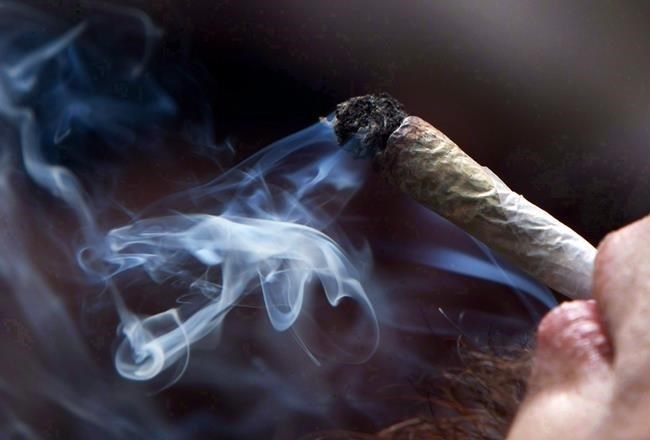
FILE PHOTO - A young man smokes a marijuana joint during a rally in downtown Vancouver, B.C., on Wednesday April 20, 2011. Ottawa is looking to set up a cannabis tracking system to collect information about marijuana products from licensed producers, distributors and retailers - just one of a host of proposed changes to be ushered in alongside legalization.
Image Credit: THE CANADIAN PRESS/Darryl Dyck
April 21, 2017 - 7:00 AM
OTTAWA - The federal government is under fire from the opposition Conservatives for failing to disclose the cost of a planned cannabis tracking system — just one of a host of proposed changes to be ushered in along with the legalization of marijuana.
Health Canada said the system would be designed to collect information about pot products from licensed producers, distributors and retailers, adding it would not track individual cannabis users.
The department also said it would allow businesses and regulators to trace all products and address recalls.
"They want to put a pot registry in but they are not telling us about how much it is going to cost," said Conservative health critic Colin Carrie. "It is just basically more shady behaviour when it comes to this file."
The tracking would help to ensure cannabis is not being diverted to illegal markets, Health Canada said in a statement, given the government's stated and oft-repeated goal of limiting organized crime's footprint in the pot trade.
"Mandatory product track-and-trace systems are common features in other jurisdictions that have legalized cannabis for non-medical purposes," the department said.
The specific requirements of the system still need to be developed, Health Canada added, noting similar systems are used in the U.S. to gather information about cannabis products.
The department did not say how much the proposed tracking system would cost — only that it intends to offset such costs through licensing and other fees.
The government's marijuana legislation tabled last week also failed to offer specifics on tax measures for the legalized regime.
Alistair MacGregor, the NDP's justice critic, said he is surprised the government can't offer more information.
"On the day this bill was announced, they did bring out the minister of national revenue," MacGregor said. "One of the biggest questions we have is the cost of implementing not just this (cannabis) registry but all of the enforcement measures; How much of this is going to be downloaded on to the provinces?"
On Thursday, thousands across the country marked the annual pot celebration known as 4-20, though some marijuana activists expressed concern about the government's legalization efforts.
Alex Newcombe, a 31-year-old who says he uses marijuana to help his anxiety, said he is disappointed by the Liberal legislation introduced last week.
"It is not anything other than prohibition 2.0," Newcombe said, who is especially upset that Prime Minister Justin Trudeau and his Liberals have not taken steps to decriminalize the drug in the interim.
"He's the one stopping it at the moment —we're calling him out on it."
Mike Ness, a 27-year-old who has been smoking marijuana more than half his life, said Thursday that arresting people for small amounts of marijuana does not make sense if the drug will soon be legalized.
"People are still going to do what they are going to do," Ness said. "You can bust them if you want, but it is not really going to change anything. If I go to jail, I'm going to come out and smoke a big joint."
Lauren McDowell, a 32-year-old who started using marijuana to treat pain after a 2014 car accident, agrees it makes no sense to criminalize pot for more than another year.
"It is a plant . . . I think that's my biggest problem," she said. "It is shameful."
The federal government has said repeatedly it has no plans to decriminalize marijuana until legalization is in place — a goal it hopes to achieve by July 2018.
Trudeau, who admitted to smoking pot after becoming an MP, told Bloomberg on Thursday that Canada's legalization strategy is built around a recognition that marijuana is "not good" for the developing brains of young people.
"We need to do a better job of making it more difficult, at least as difficult as it is to access alcohol as it can be," he said.
Criminal organizations and street gangs collect billions every year from illicit marijuana sales, he added, noting this money is then funnelled into other criminal activities.
"So you put those two things together and realize we have a system that isn't working," Trudeau said.
—Follow @kkirkup on Twitter
News from © The Canadian Press, 2017